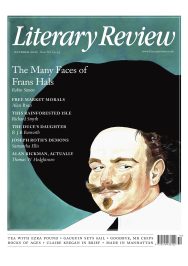Alan Ryan
Traders in Our Midst
Free Market: The History of An Idea
By Jacob Soll
Basic Books 336pp £25
If anyone is qualified to write a history of free-market thinking, it is surely Jacob Soll. He is a professor of history, philosophy and accounting at the University of Southern California, and he has needed to draw on all three disciplines to write this history, which stretches from Cicero to Milton Friedman and beyond. The book is simultaneously interesting and frustrating. The subject’s interest is obvious enough: given the striking success of free marketeers over the past three decades in dictating government policy in the Western world, the ideas that animate them are plainly important.
The frustration stems from the author’s ambitions. He doesn’t merely begin with Cicero and end with the Chicago School but crams in so much else that the reader is alternately left saying ‘hold on a moment’ and ‘please explain’. That much of the detail is fascinating in itself adds to the sense that Soll should have concentrated his forces a little – or written twice as long a book.
What we have is interestingly contentious. As any such book is likely to do, Free Market employs Adam Smith as a hinge. But in contrast to the standard triumphalist picture of the simultaneous rise of free trade and the Industrial Revolution, in which Smith is portrayed as a precursor of 19th-century economic theorists like Marx (who, of course, saw himself as the heir of Smith), Soll roots Smith firmly in the soil of the 18th-century agricultural economy. Smith’s purpose in writing The Wealth of Nations was not to compose a hymn to the virtues of the unfettered market but to set out the need for an elite of disinterested, upper-class landowners to steer and manage a society that might otherwise succumb to the kind of corruption that the unbridled pursuit of economic self-interest is likely to bring in its train. Merchants, whom one might think the heroes of free-market theory, are treated with extreme suspicion. Wherever ‘people of the same trade … meet together, even for merriment and diversion’, said Smith, the conversation will more than likely turn into a ‘conspiracy against the publick, or in some contrivance to raise prices’.
Who, then, is the hero of Free Market? The answer is Cicero. One might think this a surprising choice. Cicero has a good deal to say about the virtues of generosity and public spirit, but little about thrift, careful investment or what one might think of as the

Sign Up to our newsletter
Receive free articles, highlights from the archive, news, details of prizes, and much more.@Lit_Review
Follow Literary Review on Twitter
Twitter Feed
It wasn’t until 1825 that Pepys’s diary became available for the first time. How it was eventually decrypted and published is a story of subterfuge and duplicity.
Kate Loveman tells the tale.
Kate Loveman - Publishing Pepys
Kate Loveman: Publishing Pepys
literaryreview.co.uk
Arthur Christopher Benson was a pillar of the Edwardian establishment. He was supremely well connected. As his newly published diaries reveal, he was also riotously indiscreet.
Piers Brendon compares Benson’s journals to others from the 20th century.
Piers Brendon - Land of Dopes & Tories
Piers Brendon: Land of Dopes & Tories - The Benson Diaries: Selections from the Diary of Arthur Christopher Benson by Eamon Duffy & Ronald Hyam (edd)
literaryreview.co.uk
Of the siblings Gwen and Augustus John, it is Augustus who has commanded most attention from collectors and connoisseurs.
Was he really the finer artist, asks Tanya Harrod, or is it time Gwen emerged from her brother’s shadow?
Tanya Harrod - Cut from the Same Canvas
Tanya Harrod: Cut from the Same Canvas - Artists, Siblings, Visionaries: The Lives and Loves of Gwen and Augustus John by Judith Mackrell
literaryreview.co.uk